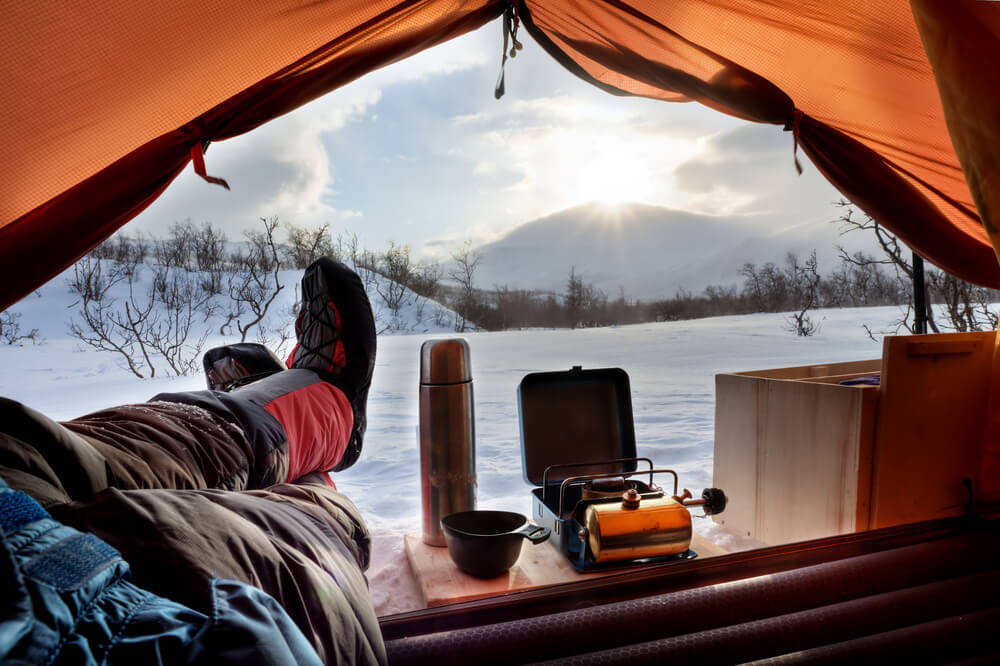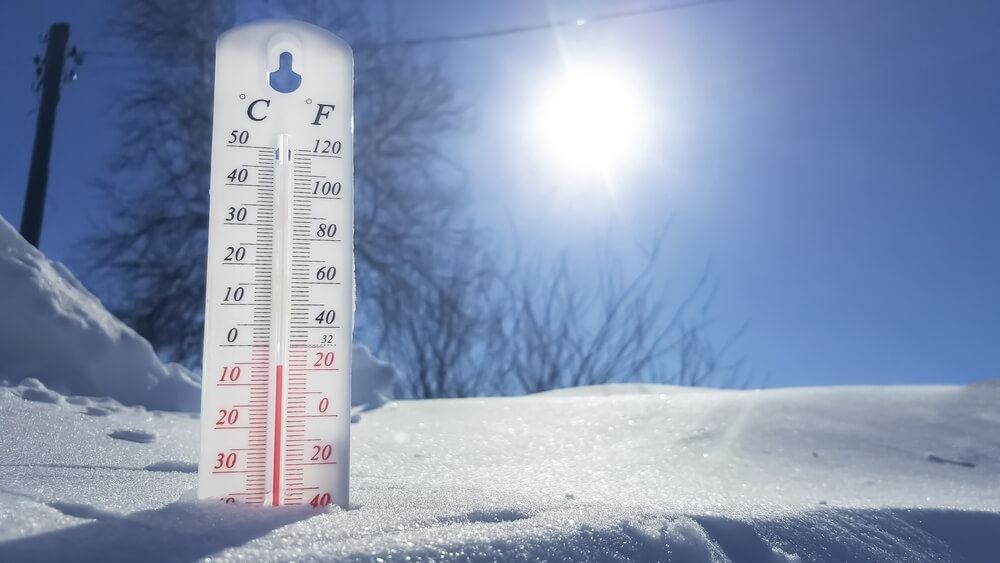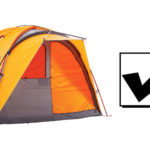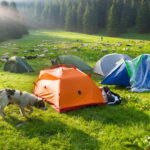There are a lot of hikers who prefer to hike only in a certain type of weather. The same goes for camping – some campers like to camp only in warm weather, while others would rather camp in the cold. Yet, an experienced camper would know that there is different gear for camping in different weather, and it is crucial to have certain things if you want the trip to be successful.
This is where things get interesting. If you are new to camping, you should know that you can choose between a three-season tent and a four-season tent. The two are different because the first is suitable for spring, summer, and autumn camping, while the second is suitable for camping only in winter. You have to know this to avoid getting a tent that will not be suitable for camping in your preferred weather conditions.
So, in today’s guide, I want to focus on the temperature range of three-season tents, while I will also mention the temperature range of four-season tents.
If you want to learn more about these types of tents and what weather to use them in, stick around. I bet you will learn many tent-related things that you did not know before!
More...
Table of Contents
What Temperatures Are 3 Season Tents Good For?
Three-season tents are perfect for year-round camping. Most three-season tents come with the recommendation to use them in spring, summer, or autumn. They perform best in these weather conditions, but that does not mean that you cannot use them in the wintertime.
Three-season tents can perform well as all-season tents, but you will need to do a few things to make them suitable for winter conditions. You will need sufficient sleeping insulation and insulation that you can add to the outside of the tent. This means that you will have your work cut out for you!
If you do not want to spend time insulating the three-season tent, you can always buy a separate four-season tent that you can use in harsh winters. It does not have to be an expedition tent or a heavy-duty tent. Any 4-season tent will be good if you are not planning on doing extreme camping.
But let’s get back to three-season tents. There are many such tents that you can find on the market. Some come with more lightweight material and offer more ventilation. These tents are more suitable for summer camping when you want to stay cool during the warm nights.
In comparison, you can find three-season double-walled tents with better insulation properties. They do a great job trapping the heat inside, meaning they can hold warmth better. This type of tent would be more suitable for spring or autumn camping when the temperatures drop during the night.
Best 3 Season Tents - TOP 3 Picks

Can You Use a 3 Season Tent In The Winter?
As mentioned before, some 3-season tents also perform well during the winter. Some campers even prefer them over heavy-duty winter tents. The heavy-duty or expedition tents tend to be more expensive and more suitable for intense weather conditions.
If you are not planning on doing extreme camping, a three-season tent can also be a good choice. It can withstand intense weather conditions to a certain degree, but you might need to do something about the insulation.
For example, some 3-season tents have great insulation and can keep you comfortable even in harsher weather conditions. They have a sturdy build with less ventilation, and they usually come with a heavy-duty fly that you can put on top of the tent. These things are all going to make the tent more winter-friendly.
This all goes for camping in typical winter conditions. If you plan on doing extreme camping, you will need to get a 4-season tent. That tent will stay warm and comfortable even in very heavy rain or heavy snowfall. It is smart to invest in that kind of tent if you plan to use it often!
How Do You Insulate a 3 Season Tent?
Let’s say that you have a 3-season tent that you love using in all weather, but the weather conditions for your upcoming trip seem a bit harsh. You might be wondering if there is anything that you can do about it – and the answer is yes! There are several simple ways to insulate your tent and make it suitable to withstand the cold. Here are some of them:
Sleeping insulation
It is always good to bring sufficient sleeping insulation on a winter camping trip. You never know how cold the nights will get, and it is better to be safe than sorry!
As for sleeping insulation, I recommend using a thick sleeping pad. The pad can serve as ground insulation, not allowing your body to feel the coldness of the ground. At the same time, I recommend that you pair that sleeping pad with a quality sleeping bag.
When it comes to winter sleeping bags, I say the tighter – the better! Even though you can always wear warm clothing to stay warm, having a tight sleeping bag will help trap the heat from your body and keep you warm.
Besides a sleeping pad and sleeping bag, always have a thermal layer of clothing you can put on. Thermal clothing is a must for campers who camp in the cold. It can make all the difference when it comes to warmth while still keeping you comfortable!
Covering for the tent
You can always insulate the outside of the tent instead of the inside. There are countless thermal blankets that you can use on the inside or outside, while most good tents come with a heavy-duty rainfly that provides great insulation.
If you do not have a good rainfly or tent covering, you should invest in one as soon as possible. You never know when you will need it – camping in the open can be unpredictable sometimes!
Heat packs
Finally, I recommend that you look into heat packs as a good insulator. If your campsite is accessible by car, you can rely on the car to help you take a lot of gear to the campsite. You can even try powering an electric heater if it gets too cold during the night.
But if the campsite is not accessible by car, you will have to rely on things like heat packs to keep you warm. They do a great job, and most of them are so small that you can place them wherever you like. It could be in the tent or in the sleeping bag itself. The choice is yours!
I would also recommend that you look into heated gloves or heated socks if you plan to camp in cold conditions. They offer a lot of warmth while are still very affordable, easy to pack, and suitable for everyone.

Do Tents Have a Temperature Rating?
Most tents do have a temperature rating. Let me tell you how you can divide most tents and what type of weather they are most suitable for!
First of all, you have the tents rated 1 or 2. These are most suitable for summer camping, but you can also use them in spring or autumn. These are usually three-season tents with good insulation.
Then, you have the tents rated 3. These are suitable for year-round camping as they offer good insulation and good ventilation. You will need to add an insulating layer to them if you plan to camp in colder weather.
Tents rated 4 are winter tents. These are suitable for winter camping but not extreme expedition camping. They offer great insulation!
Finally, you have the tents rated 5. These are suitable for expedition camping only. If you are not an experienced expedition camper, you will not need this type of tent.
How Much Warmer Is a 4 Season Tent?
When it comes to regular 4-season tents, the most significant difference between them and 3-season tents is in the performance during summer. Four-season tents are somewhat warmer than three-season tents, and that will be clear if you take both of these tents on a winter camping trip.
When it comes to summer camping trips, the 4-season tent is a no-no. You will feel very hot and uncomfortable in a 4-season tent during the summer. You should stick to the 3-season tent for spring, summer, or autumn and rely only on the 4-season tent in the winter!
Wrap-Up
Thank you for sticking with me through this guide! I hope you learned a lot of interesting information on tents and their temperature ranges. Remember that the three-season tent is great for camping in the spring, summer, or autumn. If you take it with you on a winter camping trip, follow my advice on insulating it and making it warmer.
Let me know in the comments below if you have a three-season tent or a four-season one. I would love to learn all about your experiences with tents so far. Also, do not hesitate to share your favorite three and four-season tents with all the other readers and me!
- Are Merrell Shoes Good? – An Unbiased Review of Merrell Footwear - December 9, 2023
- Where Are Merrell Shoes Made? - December 9, 2023
- Camping in 40-degree Weather: Tips and Tricks - September 25, 2023



![Best Wood for Campfires [Everything You Need To Know] Best Wood for Campfires [Everything You Need To Know]](https://grandcircletrails.com/wp-content/uploads/2021/11/Best-Wood-for-Campfires-1-150x150.jpg)
![Are Hiking Boots Good For Snow? [Everything You Need To Know] Are Hiking Boots Good For Snow? [Everything You Need To Know]](https://grandcircletrails.com/wp-content/uploads/2021/11/Are-Hiking-Boots-Good-For-Snow-1-150x150.jpg)

![How to Drive Stakes into Rocky Ground? [Need to Know] How to Drive Stakes into Rocky Ground? [Need to Know]](https://grandcircletrails.com/wp-content/uploads/2022/03/How-to-Drive-Stakes-into-Rocky-Ground-1-150x150.jpg)
![Why Your Campfire Smokes So Much? [Quick Answers You Should Know] Why Your Campfire Smokes So Much? [Quick Answers You Should Know]](https://grandcircletrails.com/wp-content/uploads/2021/09/Why-Your-Campfire-Smokes-So-Much-1-150x150.jpg)